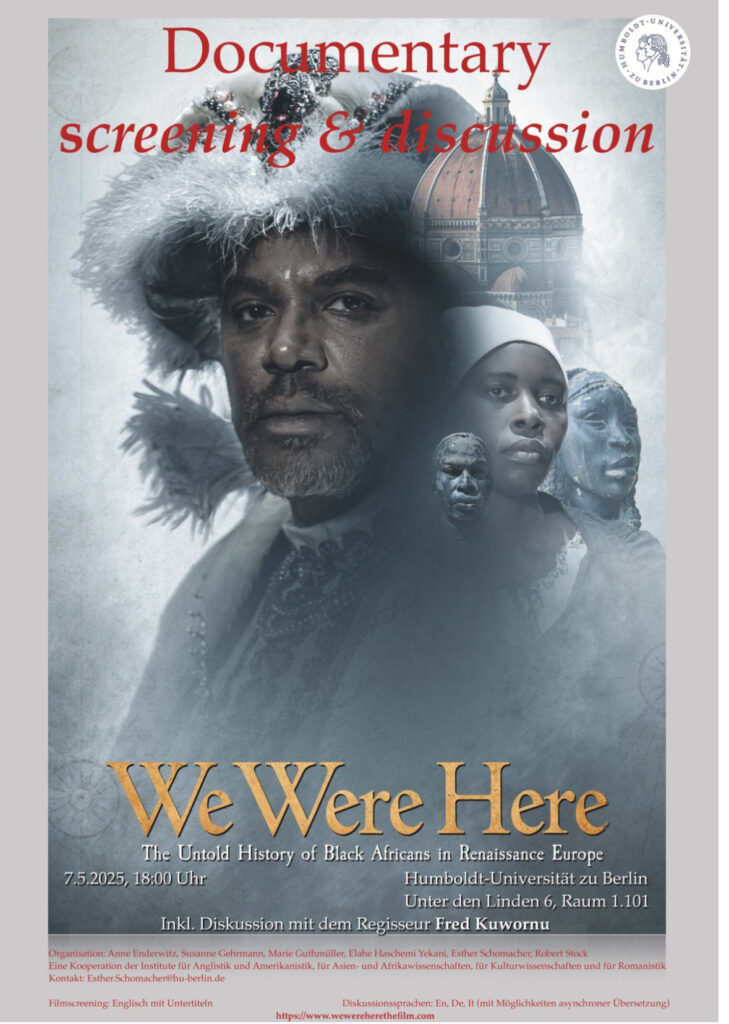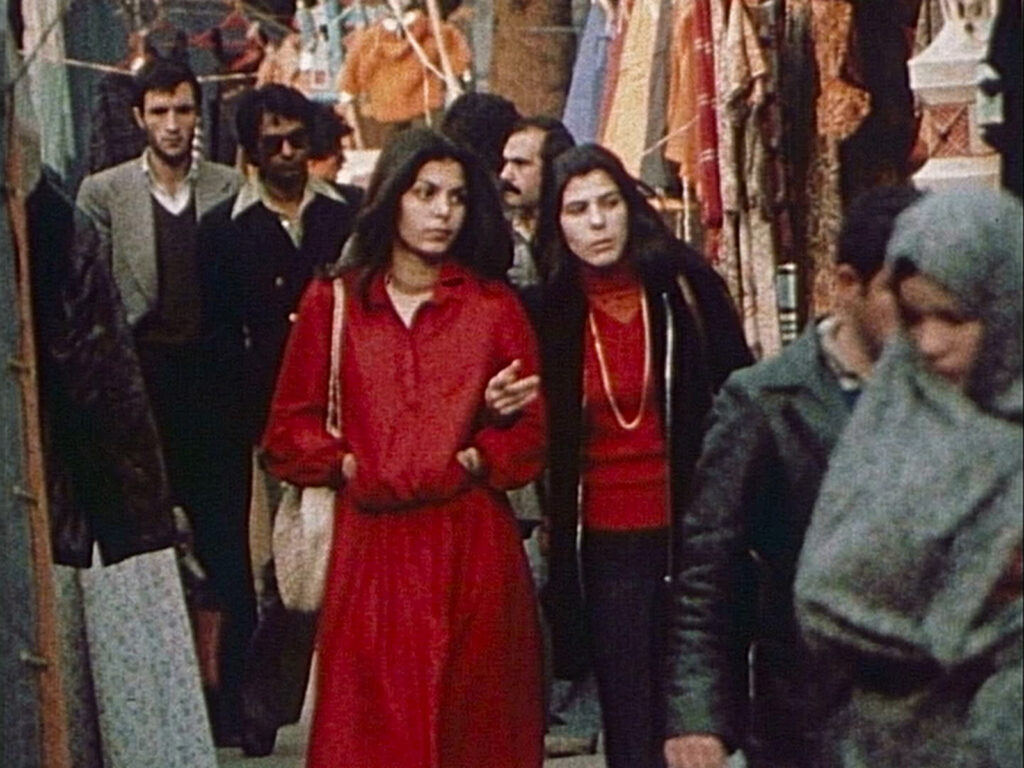
Mi., 7.5.2025
18:00 Uhr
HU Hauptgebäude, Raum 1.101
Der Dokumentarfilm “We were here” folgt den Spuren schwarzer Menschen in der Kunst und Kultur der Renaissance und legt dabei einen besondere Fokus auf ihre Beiträge und Leistungen in einer Zeit des Wandels. Er hinterfragt damit das etablierte Bild, das schwarze Menschen in der Frühen Neuzeit lediglich als versklavte, verschleppte und unterdrückte Menschen in Europa präsent waren und legt offen, dass dieses Bild selbst das Produkt (oft gezielter) Verfälschungen durch die Nachwelt ist.
2024 wurde der Film im durch Adriano Pedrosa kuratierten zentralen Pavillion der Biennale in Venedig gezeigt. Die in Kooperation der Institute für Anglistik und Amerikanisti, Asien- und Afrikawissenschaften, Kulturwissenschaften und Romanistik organsierte Veranstaltung holt ihn erstmals an eine deutsche Universität.
Im Anschluss an die Vorführung gibt es die Möglichkeit für Fragen und Diskussion mit dem Regisseur Fred Kuwornu.
Der Film wird auf Englisch mit deutschen Untertiteln gezeigt.
Diskussionssprachen sind Deutsch, Englisch und Italienisch (mit Möglichkeiten asychroner Übersetzung)


Lecture with film clips (English) and discussion (English & German) at Schauburg Dortmund. Event begins at 16:00. For reservations and more information click here.
“In my presentation I will engage in a ›conversation‹ with the 2023 documentary film Între revoluții (Between Revolutions), directed by Vlad Petri and written together with Lavinia Braniște. The film offers a poetic reflection on the in/visibility of female queer desire that I understand as a form of archival poetry invested not in linear conceptions of liberation but in the queer temporality of the in-between. I am especially interested in the juxtaposition of the fictional letters and the documentary form. The audience is presented rare historical documentary footage from the late 1970s to early 1990s from Romania and Iran while the women and their same-sex desire is never visually depicted. In many ways the narrated story and the images we are presented with do not align: we never see the women but from their longing letters we are to glean that they were lovers. The film evokes queer desires and a form of East-East political entanglement that is often overlooked in histories of the Iranian diaspora. The ordinary drama of the separated lovers plays out eventually as a temporality between revolutions that acquires yet another contemporary dimension against the backdrop of the Woman Life Freedom uprising (Zan Zendegi Azadi) in Iran.” (Elahe Haschemi Yekani)
Thao Ho will present parts of her research with a paper entitled “Letters from Berlin to Saigon to Los Angeles: Poetics and Politics of Return and Place-Making” at MELUS Conference 2025.
Anne Potjans presents on “Race and Sexual Citizenship in Guy Nzingha St. Louis’s Gedichte einer Schönen Frau.” See here for more information on the event.
Screening in collaboration with Leipzig Art Residency (LIA), Cinema Con Nhà Nghèo (Cinema of the Peasants), A Sông and Nổ Cái Bùm Festival. More information here. The conversation will be about Quế’s film Healthy Water with Diseases and topics such as war trauma, colonial indochinese era, and landscapes.
This film program accompanies the exhibition Young Birds from Strange Mountains currently at Schwules Museum in Berlin. The title is borrowed from a poem by the Vietnamese gay-closeted poet Ngô Xuân Diệu (1916-1985), who was a correspondent member at Akademie der Künste in the GDR. The project features young queer arts from Southeast Asia and its diaspora with focus on community archives, spirituality/shamanism, pre-colonial knowledge, and activist movements. This program aims to spark discussion and reclaim knowledge that is often censored and erased by both nationalist and colonial politics.
21. February 2025 12:00
Black, indigenous, and queer of color presence is often misrepresented or forgotten in historical documentation. In this archive workshop which accompanies the exhibition Young Birds from Strange Mountains, we ask ourselves how our stories appear, who narrates them, and craft our own contributions to intervene in hegemonic narratives. Our goal is to question the line between private and public archives, and formats of archiving through the lens of Southeast Asian (diasporic) queer archiving. In doing so, we hope to create a dialogue between archival materials, individuals and creativity.
More information here
As part of a group of English and American studies scholars of different career levels, Anne Potjans was invited as a discussant and is involved in subsequent network building.

On February 6th, 2025, at 15:00 GMT, Prof. Dr. Elahe Haschemi Yekani will take part in an online panel discussion exploring the impact of discrimination on research focus. This webinar is part of Springer Nature’s Sustainable Development Goals programme.
Sign up and join here: https://cassyni.com/events/QJmLergTtcMtzXRcSoxmQ1
Join us for the session „War memories and the Environment“ of TODO team member Thao Ho‘s seminar „American War in Vietnam: Protest and Memory Culture“ on 30.01.2025 with a guest lecture by Maithu Bùi:
Operation Remediation
Maithu Bùi’s work examines networks of violence at the intersection of collective history, science and technology. Operation Remediation interweaves storytelling with geohistory and science communication. Informed by their own history, their work examines never-ending wars and the diffusion of exploitative technologies. Their upcoming work Operation Remediation explores the exploitation of marginalized life forms in the disposal and detection of explosives and their impact on ecology.
The guest lecture will refer to the selected texts by Zani and Stoler.
Please register at hodacmit@hu-berlin.de.
Along with Maithu Bùi’s work, we will discuss „Bomb Ecologies“ by Leah Zani and „The Rot Remains“ by Ann Laura Stoler. PDF files will be send upon registration.
On January 28th 2025, from 16:00 to 18:00 (DOR 24, Raum 1.101), Fenja Akinde-Hummel and Elahe Haschemi Yekani will present a lecture on “Polyphony and the Postcolonial Novel” as part of the Ringvorlesung Literatur und Musik at Humboldt-Universität zu Berlin.
For more information, click here


